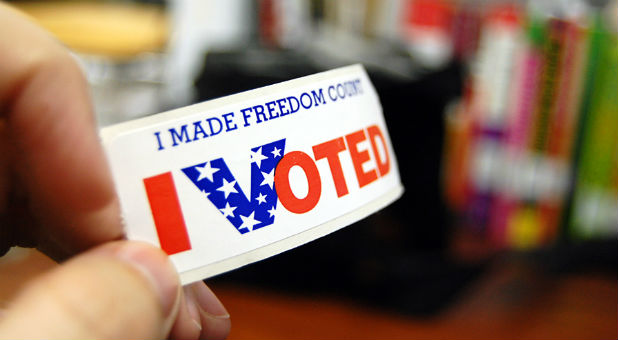Elections Expose Deep Divide Among American Evangelicals
Americans with evangelical beliefs share a great deal in common. They trust in Jesus alone, evangelize their neighbors and believe the Bible is the final authority in their lives.
But when it comes to voting, race and political affiliation still divide evangelicals, according to a survey from Nashville-based LifeWay Research taken before the second presidential debate.
Overall, fewer than half (45 percent) of those with evangelical beliefs plan to vote support Donald Trump, according to the survey. A third (31 percent) say they will vote for Hillary Clinton. Fifteen percent are undecided. One in 10 (9 percent) support a third-party candidate.
White Americans with evangelical beliefs favor Trump (65 percent) over Clinton (10 percent). Sixteen percent are undecided. Eight percent plan to vote for Gary Johnson.
African-Americans, Hispanic Americans and Asian-Americans with evangelical beliefs support Clinton (62 percent) over Trump (15 percent). Thirteen percent are undecided. Seven percent support Gary Johnson.
LifeWay Research also found that party affiliation is a much stronger predictor of voting preferences than faith. Three-quarters of Republicans with evangelical beliefs plan to vote for Trump. Though a smaller sample, 75 percent of Democrats with evangelical beliefs plan to vote for Clinton.
Scott McConnell, executive director of LifeWay Research, said the divides among evangelicals will remain regardless of twists and turns in the election season.
“This group of Christians shares the same core beliefs—but they don’t vote the same way,” said McConnell. “There are significant cultural and political divides among evangelicals that will remain long after the election is over.”
Politics More Unifying Than Faith
The representative online survey asked 1,000 Americans four questions about core evangelical beliefs on the Bible, the crucifixion of Jesus, salvation and evangelism. Those who strongly agreed with all four (17 percent) qualified as having evangelical beliefs.
The idea is to define evangelicals by belief rather than self-identified religious affiliation, said McConnell.
“The evangelical label has picked up political and social overtones that mask any patterns that are actually tied to evangelical religious beliefs,” he said.
For example, many political surveys look only at self-identified white evangelicals, who have tended to support Republican presidential candidates, including Trump. The pool of Americans with evangelical beliefs, however, is more diverse. Four in 10 Americans with evangelical beliefs are African-American, Hispanic American, Asian-American or other ethnic minority. Six in 10 are white. Those with evangelical beliefs also have more diverse political views, according to LifeWay Research.
As part of the survey, researchers looked at how people with evangelical beliefs and churchgoers see the issues at play in the 2016 election. Topics like personal character, abortion and religious liberty—often identified as key evangelical issues—matter less in this election. Other pragmatic concerns—like the economy and national security—are more influential.
For Americans with evangelical beliefs, a candidate’s ability to improve the economy matters most (26 percent), followed by national security (22 percent) and personal character (15 percent). Few emphasize Supreme Court nominees (10 percent), religious freedom (7 percent), immigration (5 percent) or abortion (4 percent).
For self-identified Christians who go to church at least once a month, the economy (30 percent), national security (23 percent) and personal character (15 percent) top their concerns. Few prioritize Supreme Court nominees (10 percent), religious freedom (6 percent), immigration (4 percent) or abortion (3 percent).
Overall, the economy (30 percent) is the top concern for Americans regardless of religious affiliation. National security (17 percent) and personal character (17 percent) also are significant. Supreme Court nominees (10 percent), immigration (5 percent), religious freedom (2 percent) and abortion (1 percent) are less important.
Religion Plays a Role
Still, religion does seem to affect voting patterns.
Self-identified Christians who go to church at least once a month favor Trump (41 percent). A third (34 percent) plan to vote for Clinton. Eighteen percent are undecided. Six percent support a third-party candidate.
Americans who skip church are more likely to support Clinton (46 percent). A third (31 percent) plan to vote for Trump. Fifteen percent are undecided. Eight percent favor a third-party candidate.
Those without evangelical beliefs also favor Clinton (45 percent). Thirty-two percent plan to vote for Trump. Sixteen percent are undecided. Eight percent plan to vote for a third-party candidate.
A previous LifeWay Research poll of Protestant pastors found that most clergy don’t expect Christians to vote the same way. Two-thirds (65 percent) disagree with the statement, “Christians who truly vote their conscience will vote for the same candidate.” Less than a third (29 percent) agree. Six percent are not sure.
McConnell says neither major party in the United States has a monopoly on biblical values. So it’s no surprise, he says, that evangelicals who value the Bible will vote differently.
“Until one party or one candidate embodies everything that evangelicals believe, there is no reason to expect them to vote the same way,” he says.
Still, McConnell worries that the polarizing rhetoric of the 2016 election will spill over into churches. The Christian faith is supposed to unite people “from every nation, tribe, people and language around Jesus Christ, not a politician,” said McConnell, citing the New Testament book of Revelation.
“Christianity includes peoples from different political parties as well,” he said. “Sometimes I think evangelicals forget that.” {eoa}
For more information on the survey, visit lifewayresearch.com or download the full report PDF.














































